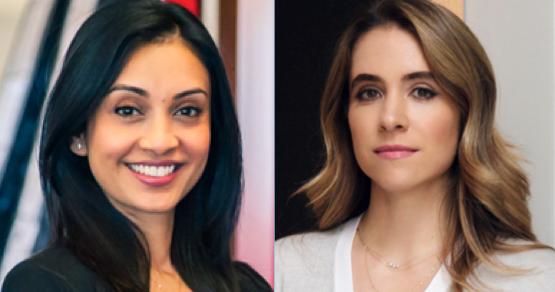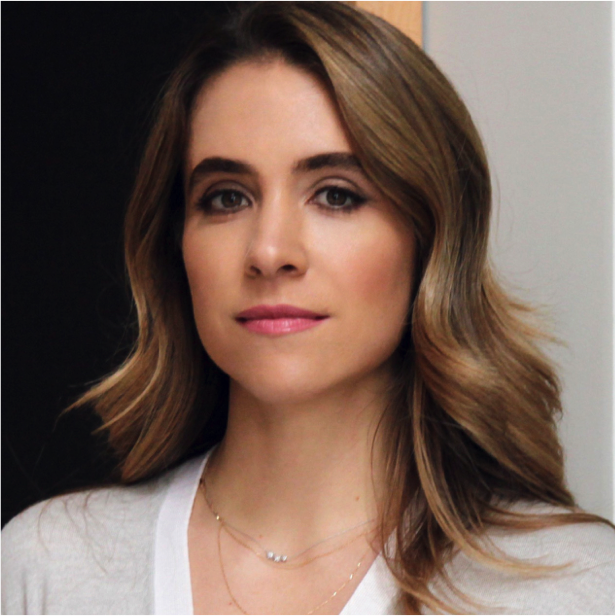
Left to right: Dulari Amin, Principal at Synergy Ventures and Eva Yazhari, CEO of Beyond Capital Fund. Photo courtesy of Amin and Yazhari.
Editor’s Note: This is the sixth in a series of articles. To read other articles in the series, click here: article 1, article 2, article 3, article 4, article 5
Over the past four months I have interviewed 18 women who are trendsetters and innovators in the impact and sustainable finance sector. These women leaders are clear about today's capital market opportunities and risks. They are embracing both as the investment industry transitions toward a low carbon economy with greater emphasis on the economic value of intangible corporate assets and social impact enterprises.
These women are using their industry experience and leadership platforms to articulate a powerful message at the system level of financial services. They believe non-financial data is integral to the full understanding of a company’s potential to meet its stated goals for all stakeholders.
Second Generation Impact Networks
 The conviction in her voice is palpable when Eva Yazhari, CEO of Beyond Capital Fund, speaks “The generation of impact investors before ours built the foundation for what we’re doing today.” She continues, “They paved the way, making early stage grassroots strategies possible.” Before the Acumen Fund and others demonstrated a combination of social impact and profitability, according to Yazhari, the idea that startup stage investors in places like rural Africa and India could make money was almost unthinkable.
The conviction in her voice is palpable when Eva Yazhari, CEO of Beyond Capital Fund, speaks “The generation of impact investors before ours built the foundation for what we’re doing today.” She continues, “They paved the way, making early stage grassroots strategies possible.” Before the Acumen Fund and others demonstrated a combination of social impact and profitability, according to Yazhari, the idea that startup stage investors in places like rural Africa and India could make money was almost unthinkable.
Yazhari has 14 years of experience working in the impact investment, venture capital and asset management industries. She co-founded Beyond Capital Fund in 2009 as a nonprofit, social impact fund that invests in for-profit social enterprises throughout India and East Africa.
Beyond Capital board member, Dulari Amin, joins the conversation from her perspective, which includes having grown up in rural India. “I grew up in a small town in India where most organizations were government funded. There was no transparent way to measure impact,” she says, “because the framework for that did not exist.” Despite the many budding entrepreneurs financing terms were not available through the banks, which focused on asset-backed business models and considered the entrepreneurial business model too risky. There were no private sector organizations like Beyond Capital to build transparency and measurable impact into the entrepreneurial startup model.
 Amin is a Principal at Synergy Ventures. She invests in and is an advisor to early stage and growth companies. Her focus is consumer brands and disruptive technologies. Previously, she was co-founder and president of Phenomenon, a brand strategy and creative agency. From 2006-2017, she boot-strapped Phenomenon to over 120 employees.
Amin is a Principal at Synergy Ventures. She invests in and is an advisor to early stage and growth companies. Her focus is consumer brands and disruptive technologies. Previously, she was co-founder and president of Phenomenon, a brand strategy and creative agency. From 2006-2017, she boot-strapped Phenomenon to over 120 employees.
Beyond Capital generates a 27 percent IRR on the diverse portfolio of early stage impact strategies it manages. This kind of performance allows the firm to directly impact the lives of people living under the poverty line and fully integrate this objective into its mission as a non-profit organization. “What Beyond Capital is able to do around funding entrepreneurial businesses is incredible,” says Amin. “It was a no-brainer for me to join the board, and we have a lot more work to do.”
In addition to the experience and talents of board members like Dulari Amin, Eva Yazhari enjoys the support she gets from impact investing organizations like the Aspen Network of Development Entrepreneurs (ANDE) and TONIIC, the global action network for impact investors. “Simply put, without follow-on funders our investments can’t succeed,” she says. “That means they can’t grow financially or from a social impact perspective.” Another value-add from networking with providers of resources to Beyond Capital’s portfolio companies is the potential they have as sources of deal-flow. Two members of the firm’s leadership team have recently spent time in east Africa meeting with other impact investors to brainstorm opportunities.
Technologies To Expand Impact
Amin is clear that her role as a board member of Beyond Capital is to bring other social entrepreneurs and their technologies, which are exponentially more advanced than those she used in scaling her first company, to the firm’s work. “Africa and India, for example, have become mobile-first markets, using next generation mobile devices from the start.” She continues, “They will thrive on lower band-width and computing costs from day one.” She advises Beyond Capital clients on which technologies to use to grow their businesses faster.
Yazhari cherishes board members like Amin, who join for the win/win opportunity. She looks for people who understand what it means to be the entrepreneur trying to grow a small business and working alongside investors and restructuring experts. “We want each board member to be a value-add for Beyond Capital, our client companies and for themselves as board members,” she smiles, “and we want them to be evangelists, leveraging other networks for Beyond Capital and impact investing as a whole.”
Keeping Beyond Capital’s team focused on the business opportunities within the global framework of rapid population growth, millennial generation employment uncertainty and environmental and climate risk is what Eva Yazhari thrives on as a social entrepreneur. A good example is the Beyond Capital portfolio company Sanergy, that franchises toilets in the slums of Nairobi, a rapidly growing coastal African city with critical infrastructure needs.
The company creates jobs for people who want to grow a business and provide clean sanitation in a dignified way. Toilets are serviced daily and have a hand-washing station nearby, providing a better alternative for waste treatment in the slums. People pay to use the toilets, but the business owners make money by turning the waste into fertilizer and animal feed. This is one example of a market opportunity created by rapid urban population growth in African and Asian mega-cities. And it turns out that these waste recycling systems use more advanced technology than those in the United States, by comparison. “They have leapfrogged our waste treatment technology,” offers Yazhari, “in the same way that mobile money payments are leapfrogging the western banking system infrastructure in large, developing economy population centers.”
Forward-looking financial advisors and investors should take every opportunity to learn more about the rapidly growing market for impact investing. It’s clear today that women and millennial social entrepreneurs see impact strategies as part of a collaborative and disruptive approach to the public and private markets investment process.
Paul Ellis founded Paul Ellis Consulting to work with financial advisors who want to integrate sustainable and impact investment strategies for their clients.